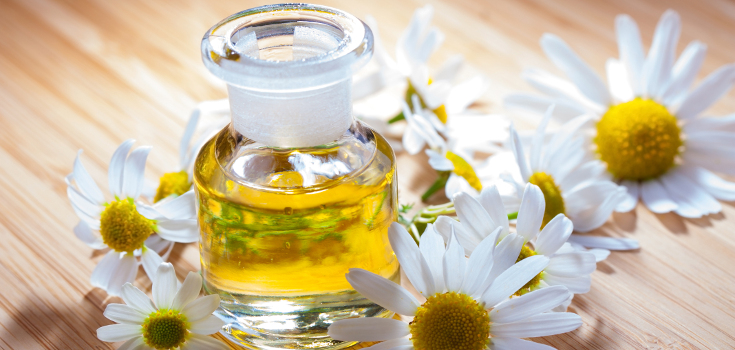Researchers: Chamomile, Thyme Oil Destroy over 90% of Breast Cancer Cells

There is a myriad of natural foods and compounds that have been studied for their disease-preventing and even disease-treating abilities. While the pharmaceutical industry pushes patented drugs that cause numerous side-effects, researchers are unveiling how we can use nature’s gifts to prevent and treat ailments ranging from diabetes, to arthritis, to even cancer. For example, Chinese researchers have shown how oils as simple as chamomile or thyme can kill up to 90+ percent of breast cancer cells.
Studying some of the most popular essential oils in current use, such as mint, ginger, lemon, grapefruit, jasmine, lavender, chamomile, thyme, rose, and cinnamon, researchers sought out to discover how these oils may combat cancer. They did so by testing antibacterial potency as well as in vitro toxicology against human cancer cell lines. The cancer cell lines evaluated were the MCF-7 breast cancer cells, the A-549 lung cancer cells, and the PC-3 prostate cancer cells.
At a concentration of about 0.2%, all of the essential oils were relatively effective at inhibiting both the prostate cancer cells and the lung cancer cells, with the exception of mint essential oil.
Though when it came to the breast cancer cell lines, some of the oils were especially effective. Essential oils from cinnamon, thyme, chamomile, and jasmine were significantly potent against the breast cancer cells lines, offering greater protection.
Read: Celery Compound Found to Kill 86% of Lung Cancer Cells
The breast cancer cells were mostly destroyed by all four of these oils, with chamomile killing up to 93% of them in vitro. Even more effective was thyme oil, which led to a 97% kill rate of the MCF-7 breast cancer cells. Though it is important to remember that this research was performed in vitro – meaning that the cells were studied outside their normal biological context – like in a petri dish.
“For MCF-7 cell, the cytotoxicities of cinnamon, thyme, chamomile, and jasmine essential oils was significantly stronger than that of the other six essential oils,” explains the study. “The fractions of viable cells were reduced to 5.31%, 3.47%, 6.93% and 4.34%, respectively.”
Complimenting the findings of this research, another study published in the journal Industrial Crops and Products found that chamomile oil harnesses powerful antioxidant properties. The research, evaluating 11 essential oils including lavender, thyme, winter savory, rosemary, sage, peppermint, French tarragon, bitter, and sweet fennel, found Roman chamomile to have the highest antioxidant activity.
“Thyme and winter savory oils exhibited the greatest inhibition against the growth of all the tested organisms possibly due to the high content of thymol and carvacrol respectively,” states the study’s abstract.
Of course you don’t need to wait for further research to be done before experiencing all that chamomile has to offer. Here are 9 amazing benefits of chamomile tea – drink up!

This article is missing information. He quotes studies and mentions effectiveness of oils… BUT HOW are the oils used? Topically? internally? topically anywhere there is soft fatty tissue or topically at the site of the problem. Lungs…? topically, inhaled? Please give information that people can actually use, otherwise, all the other information is impotent. Thanks.
I wrote a whole post on this exact problem. Take a look if you have time. The post talks about “in vitro” vs. “in vivo” tests. There’s a big difference. You can read about it here – http://www.carcinoid-cancer.com/en-vitro-en-vivo/
Well let’s see essential oils are normally aPPlied on bottom of feet, chest, back, ears, charkra, and wrist
These studies were all done with the cancer cells, and bacteria in vitro, meaning all of the cells were tested outside of their biological context (i.e. test tubes). This just shows that we don’t have a real idea on how these oils will react with the same cells within the human body. I have all the hope in the world that the answer to a lot of the worlds cancer problems, is something natural, like thyme, but a lot more research is going to be needed to get a solid idea of how these oils will perform when attempting to interact with cells in the human body.
Investigate Nigella Sativa
Here I am trying to find factual information for a loved one who is terminal with cancer. The first link of research is about Rosemary and doesn’t even give mention of Thyme or Chamomile. The second link only states that Thyme was the most effective of the 10 oils tested. I’m not certain where you’re getting these percentages, however, they’re not in your links. Without real datum this article is only doing a dis-service to those looking for holistic answers.
I’m totally on board! Did you see the internet mini-series on The Truth About Cancer, episode 2? Oh, my! Truly eye opening and the doctors explain the power of essential oils. I use them with amazing results on my clients everyday!